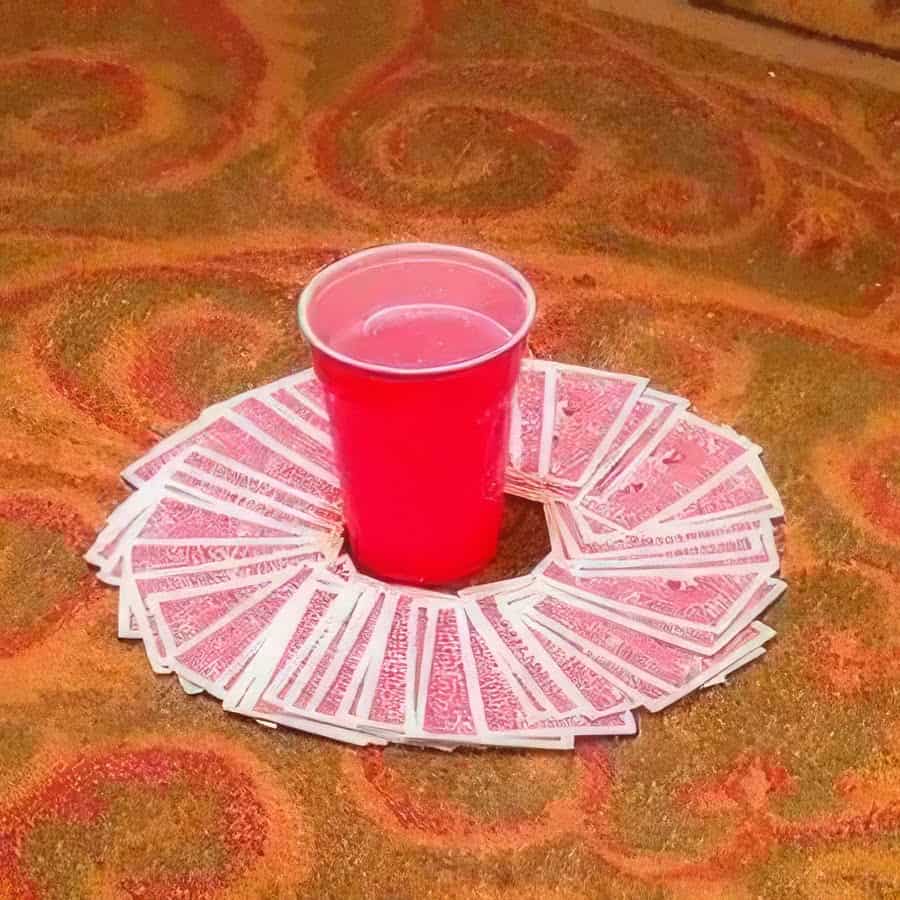Drinking games have long been a staple at social gatherings, particularly among college students, providing an entertaining way to bond and break the ice. But have you ever wondered why people are drawn to these alcohol-fueled activities in the first place? This blog post dives into the fascinating history and psychological motivations behind this spirited tradition while also exploring its potential risks and consequences.
Table of Contents
The History And Culture Of Drinking Games

Drinking games have been around for thousands of years, with evidence of ancient drinking games found in various cultures and civilizations, such as the Greeks, Romans, and Vikings.
Origins Of Drinking Games
Drinking games can be traced back to ancient civilizations, where they played a significant role in social and religious rituals. For instance, the Greeks enjoyed kottabos – an engaging party game that involved flinging wine at targets using one’s fingers or a specialized device.
The objective was not only to showcase dexterity but also to impress other guests with their skills.
Similarly, ancient China had its own version of drinking games, where players would recite poetry while consuming alcohol as part of courtship rituals or celebratory feasts.
Notably, Li Bai and Du Fu, two famous Chinese poets from the Tang Dynasty, often wrote about their experiences in these playful gatherings with friends and family members.
These examples highlight that although modern-day drinking games like Circle of Death or Uno might look vastly different than kottabos or ancient Chinese poetry recitations, the core motivations remain consistent throughout history: humans have employed them as entertaining ways to facilitate interaction among peers while enjoying alcoholic beverages together further strengthening bonds between individuals over time – even if it does involve getting intoxicated quickly at times!
Evolution Of Drinking Game Culture
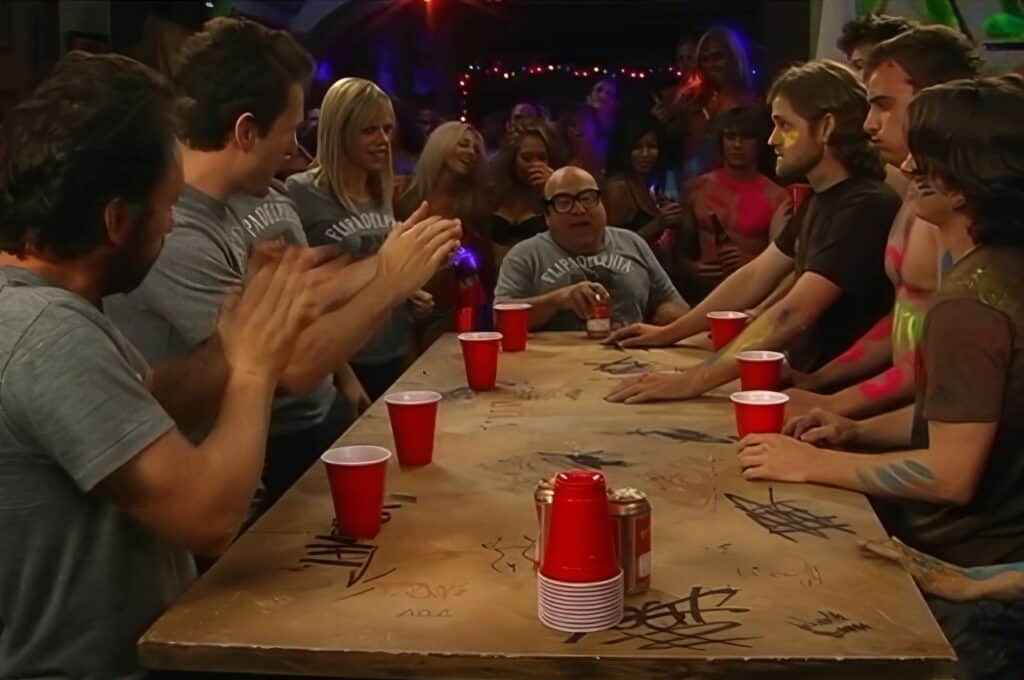
Drinking games have come a long way since their ancient origins, evolving into an integral part of modern party culture. While early versions were primarily associated with rituals and ceremonies, today, we see drinking games as diverse as Circle of Death, the Uno drinking game, and even digitized apps designed specifically for such occasions.
Over time, popular media such as movies and television shows have heavily influenced the evolution of drinking game culture. From classic college comedies like “Animal House” to TV series like “How I Met Your Mother,” mainstream entertainment often features characters indulging in various forms of alcohol-fueled fun.
The internet has also played a critical role in shaping modern-day drinking game culture by providing platforms for sharing rules and experiences related to various activities.
Social media sites allow players from all around the world to connect instantly with others interested in similar pursuits, thus creating a global community that celebrates bonding over drinks through competitive play.
Popularity Of Drinking Games Among College Students
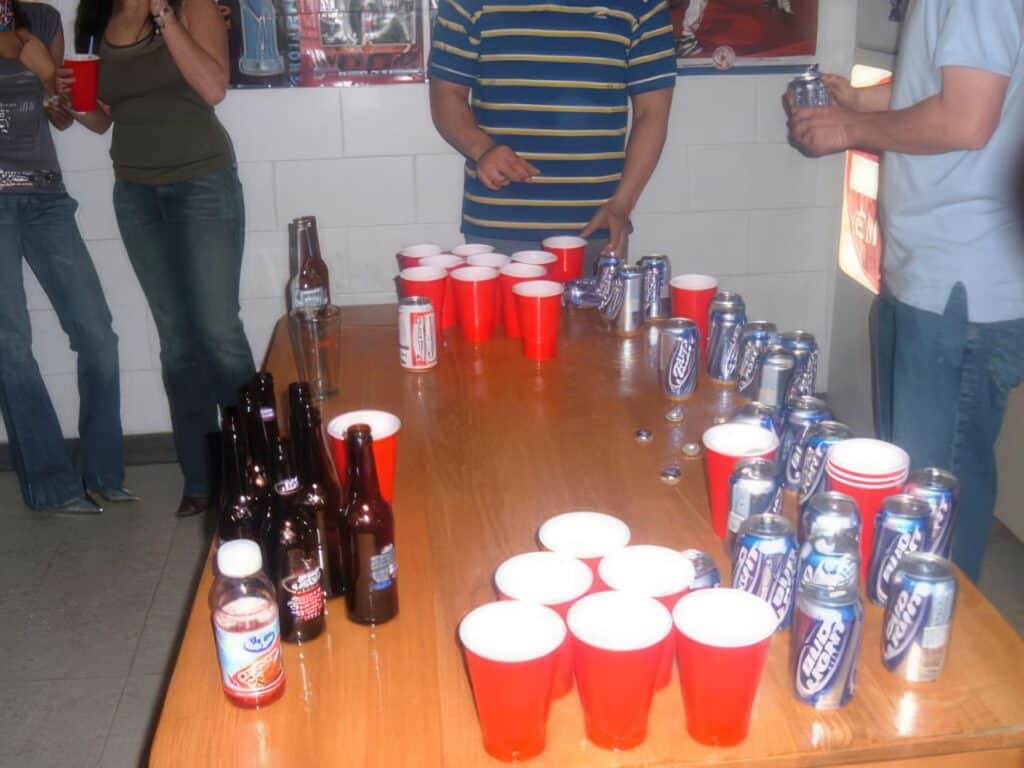
Drinking games hold a unique allure among college students, becoming a prevalent activity for socializing and celebrating throughout campuses. In fact, studies reveal that participation rates in drinking games can reach up to 91% among drinkers within this demographic.
A few factors contribute to this widespread appeal of drinking games within the college environment. Firstly, they provide an engaging way for students to break the ice and bond with their peers outside academic settings by offering various forms of entertainment such as Circle of Death or Uno drinking game.
Secondly, these activities promote a sense of competition and camaraderie while allowing participants to test personal limits by engaging in risk-taking behavior under the guise of fun.
Understanding The Psychology Of Drinking Games
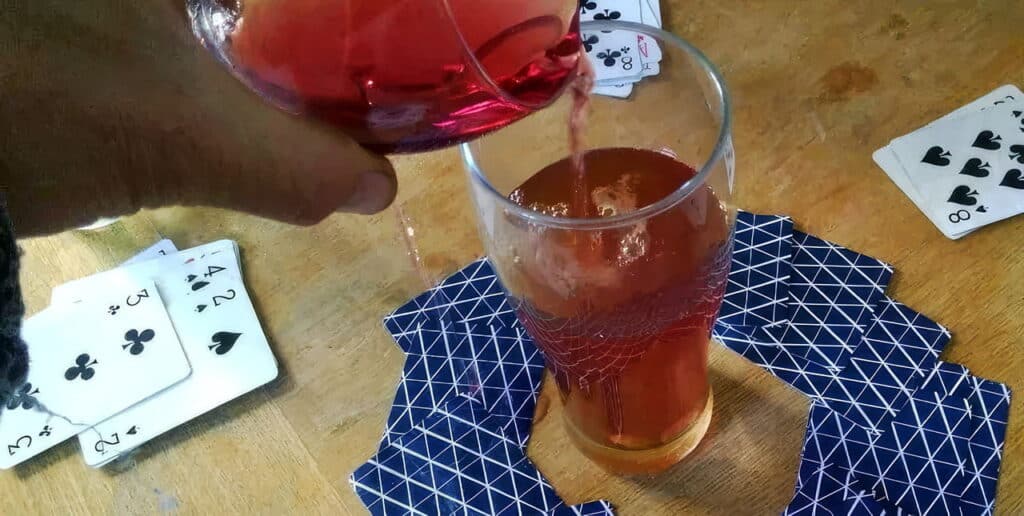
Drinking games serve as a perfect example of social facilitation theory, where players are more likely to engage in risky behaviors when surrounded by peers due to increased arousal and motivation.
Social Facilitation Theory
Social Facilitation Theory is the idea that people tend to perform better when they are in the presence of others. This theory helps explain why drinking games are often played in groups, as the presence of peers can lead to an increase in competitive spirit and a desire to impress.
Additionally, this theory suggests that individuals may be more likely to engage in risky behaviors, such as excessive alcohol consumption when surrounded by others who are also partaking.
For example, playing a game like Beer Pong with friends can create an exciting atmosphere where everyone cheers and tries to outdo one another. The thrill of competition and the desire for social interaction can make these types of activities appealing, even if they involve consuming large amounts of alcohol.
Peer Influence
Peer influence is one of the primary motivations behind why people play drinking games. It often involves a desire to fit in with a particular group, conform to peer pressure, and bond with others over shared experiences.
For instance, some individuals may feel compelled to participate in risky behaviors or consume excessive amounts of alcohol due to peer pressure. This can lead to negative physical and mental health outcomes and academic or legal consequences.
To mitigate these risks, it’s important for drinkers who choose to play drinking games with their peers to be mindful of their own limits and communicate openly about boundaries and expectations with other players.
Alcohol Expectancy Effects
Alcohol expectancy effects refer to the beliefs and expectations that individuals have about how alcohol will affect them. These beliefs can influence behavior during drinking games, as participants may expect to feel more outgoing or adventurous after consuming alcohol.
However, research has shown that these beliefs are often exaggerated and can lead to negative consequences during gaming, such as impaired judgment and risky behavior.
It’s crucial for drinkers participating in drinking games to understand the potential risks associated with alcohol expectancy effects and moderate their consumption accordingly.
While it’s natural for individuals to expect certain outcomes from consuming alcohol during game nights, it is important not to rely too heavily on those expectations or allow them to override common sense decision-making processes.
Mechanics, Engagement, And Motivation
To truly understand why people play drinking games, it’s essential to look at the mechanics of these games. Many popular drinking games involve simple rules and repetitive actions that players must execute quickly in order to stay in the game.
The thrill of competition is also a significant motivator for playing drinking games. Whether you’re playing to win or just trying to keep up with your friends, there’s an inherent sense of achievement when you successfully complete a round or take down your opponents.
Finally, socialization is another driving factor behind why people play drinking games. These games often serve as icebreakers at parties where attendees may not know each other very well.
Ultimately, understanding the mechanics, engagement levels, and motivations behind playing drinking games can help us better comprehend why this tradition has remained so popular throughout history despite its associated risks.
The Reasons Why People Play Drinking Games
People play drinking games for a variety of reasons, including enhancing thrills and excitement, social interaction and networking, sexual pursuits, coping with stress and relaxation, and conforming to peer pressure.
Enhancing Thrills And Excitement
Playing drinking games is an exciting and thrilling experience for many. It’s a way to spice up a boring night or to add some fun to parties, especially among college students.
The feeling that comes with winning is exhilarating, and this motive pushes players to give it their all during gameplay. For example, in the Circle of Death drinking game or the Uno drinking game, participants feel the rush whenever they get closer to victory.
However, while enhancing thrills and excitement may be one reason why people play drinking games, it’s important not to forget that there are also risks involved in heavy alcohol consumption.
Social Interaction And Networking
Drinking games are often played in social settings as they offer an opportunity for individuals to interact with others and build connections. The thrill of competing against one another heightens this experience, fostering a sense of camaraderie and group identity.
Drinking games involving teams, such as beer pong or flip cup, encourage players to collaborate and develop strategies.
Additionally, drinking games provide a great way for individuals who may not know each other well to break the ice and get acquainted. For example, playing “Circle of Death” or “Never Have I Ever” can reveal interesting facts about people’s lives that would otherwise remain hidden.
As alcohol lowers inhibitions and brings out our fun side, drinking games create opportunities for people to let loose and have fun in ways they might not typically do on their own.
Sexual Pursuits
Another motivation for playing drinking games is sexual pursuit. Alcohol can lower inhibitions and increase confidence, making it easier to approach potential romantic partners or engage in sexual activities.
However, this motive comes with a risk; studies have shown that women who consume more alcohol while playing drinking games are more likely to engage in sexual behavior they would not usually participate in.
In fact, participation in drinking games has been associated with specific sexual behaviors and even sexual aggression.
Coping With Stress And Relaxation
Drinking games have long been a popular way to unwind and cope with stress among many people, especially college students. The rush of adrenaline that comes with playing games like the Circle of Death or Uno can provide an instant escape from the pressures of daily life.
Fortunately, there are alternatives to using drinking games as coping mechanisms. For instance, research suggests that listening to music can be just as effective in reducing stress and anxiety levels.
Additionally, participating in low-risk activities such as exercise or creative hobbies can help reduce stress without putting oneself at risk.
Conforming To Peer Pressure
One of the most significant motivations for playing drinking games is peer pressure. Many people feel like they are expected to participate in these games, especially when everyone around them is doing so.
Furthermore, studies have consistently shown that peer influence can significantly impact an individual’s decision to consume alcohol during drinking games. This pressure often comes from the desire to fit in and be accepted by one’s peers.
However, it’s essential to remember that succumbing to this pressure can lead to negative consequences such as heavy alcohol consumption or risky behaviors.
The Risks And Consequences Of Drinking Games

Participating in drinking games can lead to heavy alcohol consumption, risky behaviors, negative physical and mental health outcomes, as well as academic and legal consequences; read on to learn about responsible tips for playing drinking games.
Heavy Alcohol Consumption
Drinking games can be a fun way to spend time with friends, but they can also lead to heavy alcohol consumption. Drinking too much in a short amount of time can have serious consequences, like memory loss or even accidents and falls.
It’s important to remember that there are risks associated with excessive alcohol use during drinking games. To stay safe while still having fun, it is recommended to know how much you’re drinking, eat before and during drinking, and count the number of drinks consumed.
Risky Behaviors
Playing drinking games often involves risky behaviors that can lead to harmful consequences. The emphasis on fast-paced and heavy drinking in these games increases the risk of intoxication and alcohol-related accidents or injuries.
One study found that individuals who participate in drinking games are more likely to report blackouts, increased aggression, and unwanted sexual encounters than those who do not play.
It’s essential for players to recognize the potential dangers associated with these games and practice responsible behavior while engaging in them.
Negative Physical And Mental Health Outcomes
Participation in drinking games can have negative physical and mental health outcomes. Heavy alcohol consumption, often associated with drinking game participation, can lead to dehydration, hangovers, and even alcohol poisoning.
This puts gamers at an increased risk for accidents such as falls or car crashes.
Furthermore, the risks of sexual assault and risky sexual behaviors increase when participating in drinking games that involve stripping or sexual dares. The consequences of these behaviors could lead to unwanted pregnancies or sexually transmitted infections (STIs).
Finally, it is especially important for college students who participate in traditional college-style drinking games like Beer Pong or Kings Cup because they tend to be more vulnerable than adults over 21 years old due to a lack of experience with heavy alcohol consumption.
Academic And Legal Consequences
Participating in drinking games can have serious academic and legal consequences. Excessive alcohol consumption can lead to poor academic performance, including missed classes, lower grades, or even dropping out of college altogether.
In addition to the risks to academic achievement, engaging in risky behavior associated with drinking games can result in legal troubles such as DUI/DWI charges or arrests for public intoxication.
It’s important to remember that the risks involved with drinking games are not just physical but also social and legal.
Responsible Drinking Game Tips
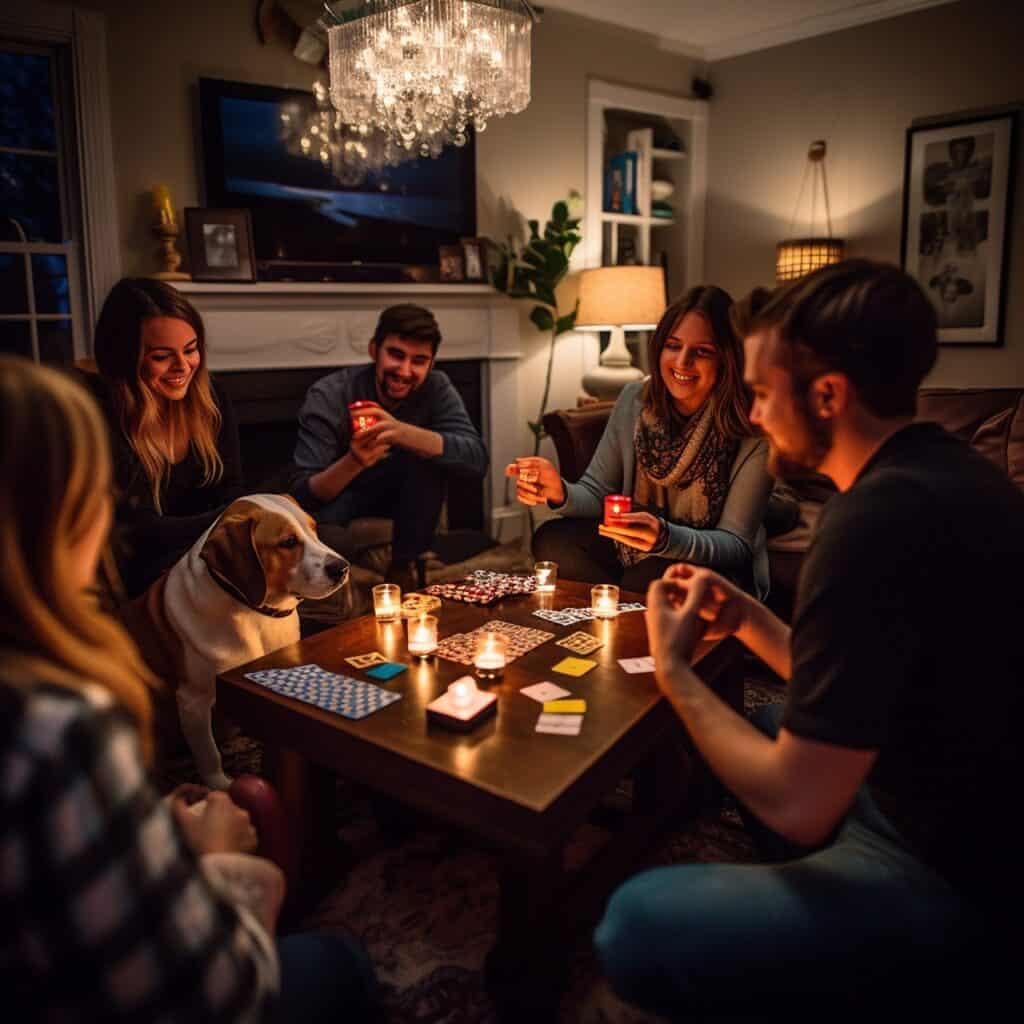
Use moderation strategies such as setting limits on the number of drinks consumed, playing low-risk drinking games, alternating alcoholic beverages with non-alcoholic ones, and encouraging safe and responsible behavior among participants.
Moderation Strategies
If you choose to play drinking games, it’s important to do so responsibly. Here are some moderation strategies to help you stay in control:
- Pace Yourself: Drink at a pace that allows you to stay aware of how much alcohol you have consumed.
- Know Your Limits: Determine your limit and stick with it. Avoid trying to keep up with others who may drink more than you.
- Eat Beforehand: Eating a full meal before drinking can help slow the absorption of alcohol.
- Hydrate: Alternate alcoholic drinks with non-alcoholic ones like water, sports drink, or soda.
- Choose Wisely: Opt for lower-alcohol content beer, wine, or spirits when playing drinking games.
- Have an Exit Strategy: Make sure that you have a designated driver or a safe way to get home when the game is over.
By following these moderation strategies, you can still enjoy playing drinking games while keeping yourself safe and in control of your alcohol consumption. Remember, never drink and drive!
Low-Risk Drinking Games
Looking for some fun and exciting drinking games without the risk of getting too drunk? Here are some low-risk options to consider:
- Beer Pong with Water: Instead of using beer, switch it out for water or another non-alcoholic beverage. This way, you can still enjoy the game without the added effects of alcohol.
- Never Have I Ever: This game is about revealing funny or embarrassing experiences. Instead of drinking, try removing a piece of clothing or doing a silly dare.
- Flip Cup with Juice: Like Beer Pong, Flip Cup can be played with juice or soda instead of alcohol for a more low-key version.
- The Name Game: This classic game is simple and requires no alcohol at all! Players take turns saying names (of people, places, things), and each subsequent name must start with the last letter of the previous name. If someone messes up, they take a sip of their drink.
Remember, drinking games should always be played responsibly and within your personal limits. By choosing low-risk drinking games and following responsible tips like alternating alcoholic beverages with non-alcoholic ones, you can still have fun without putting yourself in danger.
Alternating Alcoholic Beverages With Non-Alcoholic Ones
If you’re looking for ways to enjoy drinking games responsibly, a great tip is to alternate between alcoholic and non-alcoholic beverages. Here are some reasons why:
- Prevents Alcohol Poisoning: Drinking large amounts of alcohol in a short period can lead to alcohol poisoning, which can be fatal. Switching between alcoholic and non-alcoholic drinks can help prevent this.
- Reduces Liver Damage: Excessive alcohol consumption over time can damage your liver. Alternating with non-alcoholic beverages gives your liver a break and helps reduce the risk of long-term liver damage.
- Helps You Stay Hydrated: Alcohol is a diuretic that dehydrates the body by increasing urine production. Drinking water or non-alcoholic drinks in between alcoholic beverages helps keep you hydrated.
- Avoids Mixing Drinks: Mixing different types of alcoholic drinks can lead to nausea, vomiting, and other unpleasant symptoms. Alternating with non-alcoholic beverages reduces the chance of these negative effects.
- Keeps You Alert: Drinking only alcoholic beverages can make you feel sleepy or sluggish. Switching to a non-alcoholic drink every once in a while keeps you alert and focused during the game.
Remember that responsible drinking is crucial for your health and safety, especially when playing drinking games. By alternating between alcoholic and non-alcoholic drinks, you can have fun while taking care of yourself at the same time!
Encouraging Safe And Responsible Behavior
When participating in drinking games, it’s important to prioritize safe and responsible behavior. Moderation is key, as excessive alcohol consumption can lead to serious negative consequences.
Strategies such as alternating alcoholic beverages with non-alcoholic ones and eating before and during drinking can help prevent overindulgence. It’s also crucial to be aware of how much alcohol is being consumed by counting drinks or monitoring blood alcohol concentration (BAC).
Additionally, promoting a culture of safety within groups playing drinking games can reduce risks associated with risky behaviors. Encouraging designated drivers, establishing rules against peer pressure tactics that could lead someone to drink more than they are comfortable with, and checking in on each other throughout the course of the game can all help create a safer environment for participants.
Frequently Asked Questions (About Why People Play Drinking Games)
Why do people play drinking games?
People play drinking games for various reasons, such as to socialize with friends or to break the ice in new groups. They can also be used as a way to celebrate special occasions and milestones or simply to relieve stress and have fun.
What are some popular types of drinking games?
There are many different types of drinking game variations, including card-based games like Kings Cup or Beer Pong and dice or word-based games like Never Have I Ever or Drunk Jenga.
What are some potential risks associated with playing drinking games?
The consumption of alcohol during these activities can lead to dangerous situations if not properly monitored, especially if excessive amounts of alcohol are consumed over short periods of time. Additionally, those who participate in these activities should be aware that they may face legal consequences if authorities become involved due to noise complaints or other disturbances caused by their behavior.
How can individuals ensure safe participation while playing drinking games?
Moderation is key when participating in any activity that involves alcohol consumption – participants should always be mindful of their own limits while monitoring their peers’ consuming habits closely and taking breaks when needed. It’s also important for minors not to get involved with these types of activities because it’s illegal for them to consume alcoholic beverages until age 21, according to United States law. Sharing space only with attentive friends whom they trust (such as roommates) may reduce risk since there is someone around who will take care if things go wrong, i.e., a designated sober person present at all times; never forcing anyone into an activity against their will which includes consumption during gameplay- simple avoidance altogether being the best choice for individuals looking remain free from harm & out jail time/criminal charges/etc.
Conclusion
In conclusion, drinking games have been popular for centuries, especially among college students. People play these games for various reasons, such as to enhance thrills and excitement, social interaction and networking, cope with stress and relaxation, or conform to peer pressure.
However, it is important to remember the risks and consequences associated with excessive alcohol consumption and risky behaviors. Responsible drinking game tips include moderation strategies, choosing low-risk games, and alternating alcoholic beverages with non-alcoholic ones.
Understanding the psychology of drinking games can help individuals make informed decisions about participating in them while minimizing negative outcomes.

